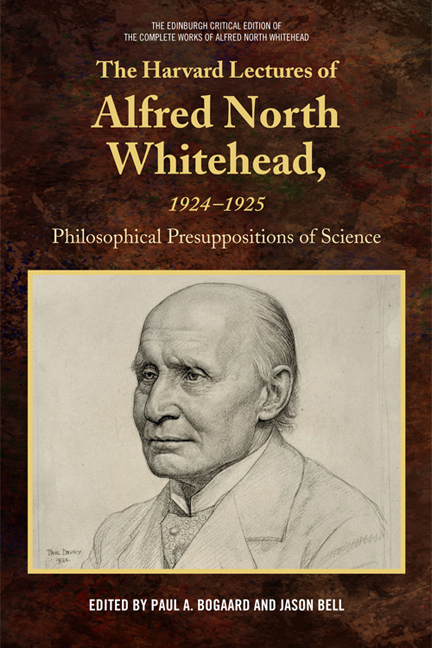Book contents
- Frontmatter
- Contents
- General introduction
- Editorial principles
- Acknowledgements
- Chronology for Alfred North Whitehead
- Published works of Alfred North Whitehead
- Introduction to The Harvard Lectures of Alfred North Whitehead, 1924–1925
- Emerson Hall lectures, Harvard Yard, 1924–1925: Notes taken by W. P. Bell and W. E. Hocking on Phil 3b, ‘Philosophical Presuppositions of Science’, delivered by Alfred North Whitehead
- Radcliffe College lectures, 1924–1925: Notes taken by Louise R. Heath on Phil 3b, ‘Philosophical Presuppositions of Science’, delivered by Alfred North Whitehead
- Whitehead Seminary, 1924–1925: Notes taken by W. E. Hocking on Phil 20h, ‘Seminary in Metaphysics’, delivered by Alfred North Whitehead
- Appendix. Scans of original handwritten notes
- Index
Introduction to The Harvard Lectures of Alfred North Whitehead, 1924–1925
Published online by Cambridge University Press: 07 December 2017
- Frontmatter
- Contents
- General introduction
- Editorial principles
- Acknowledgements
- Chronology for Alfred North Whitehead
- Published works of Alfred North Whitehead
- Introduction to The Harvard Lectures of Alfred North Whitehead, 1924–1925
- Emerson Hall lectures, Harvard Yard, 1924–1925: Notes taken by W. P. Bell and W. E. Hocking on Phil 3b, ‘Philosophical Presuppositions of Science’, delivered by Alfred North Whitehead
- Radcliffe College lectures, 1924–1925: Notes taken by Louise R. Heath on Phil 3b, ‘Philosophical Presuppositions of Science’, delivered by Alfred North Whitehead
- Whitehead Seminary, 1924–1925: Notes taken by W. E. Hocking on Phil 20h, ‘Seminary in Metaphysics’, delivered by Alfred North Whitehead
- Appendix. Scans of original handwritten notes
- Index
Summary
On February 6, 1924, the President of Harvard University, A. Lawrence Lowell, wrote to Whitehead, asking whether he would accept an appointment as Professor of Philosophy for five years….
Thus begins the ‘Migration to Harvard’ chapter of Victor Lowe's biography of Whitehead, detailing the steps leading to this formal offer and its aftermath. It marked the transition out of a career devoted to teaching mathematics and mathematical physics. It led into an extended career, well beyond five years, devoted to philosophy. This volume of lectures reflects the first step in that transition.
When Whitehead received this formal invitation he was days away from turning 63. A full career already lay behind him: 26 years as a Fellow at Trinity College, Cambridge, another 13 years teaching applied mathematics and serving in administration at the University of London, with over 50 books, articles and presentations to his credit. Nevertheless, Whitehead was not yet ready to retire.
The Chairman of the Philosophy Department assured Whitehead that they would arrange plans within the department ‘so that you could give your energy to the problems which interest you the most’. That might include a lecture course on the philosophy of science and one evening a week devoted to discussion of metaphysics and logic with graduate students. When his wife asked him about this invitation to Harvard, Whitehead is said to have responded: ‘I would rather do that than anything in the world’.
They crossed from old England to New England in August and by 25 September Whitehead had plunged into the first course of philosophy lectures he had ever given. For these lectures he chose the title: ‘The Philosophical Presuppositions of Science’. Within the departmental course listings it was ‘Phil 3b’ and it extended through both ‘halves’ of the year. Arrangements were made for Whitehead to teach this course in Emerson Hall within Harvard Yard, and also at Radcliffe under the same course listing and title – likely in Fay House.
- Type
- Chapter
- Information
- The Harvard Lectures of Alfred North Whitehead, 1924-1925Philosophical Presuppositions of Science, pp. xxv - livPublisher: Edinburgh University PressPrint publication year: 2017

